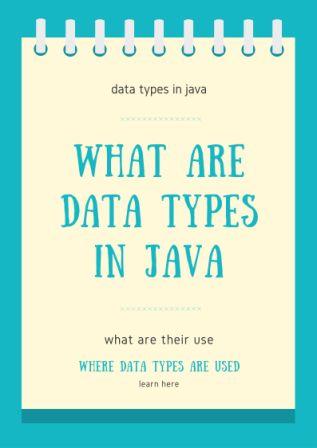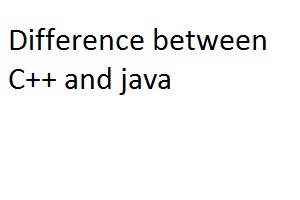Java is very interesting language.
- And you will be surprised to know that, it is very simple to learn.
- java is one of the most popular language for programming.
- we will be dealing with such a basic elements of java and
- we will go forward to get mastery in java.
- java is a programming language created in 1995, Oracle is the owner of java, currently more than 3 billion people run java.
- java is object oriented programming language.
MORE ABOUT JAVA
Object Oriented − In Java, everything is an Object. Java can be easily extended since it is based on the Object model.
Platform Independent − Unlike many other programming languages including C and C++, when Java is compiled, it is not compiled into platform specific machine, rather into platform independent byte code. This byte code is distributed over the web and interpreted by the Virtual Machine (JVM) on whichever platform it is being run on.
Simple − Java is designed to be easy to learn. If you understand the basic concept of OOP Java, it would be easy to master.
Secure − With Java's secure feature it enables to develop virus-free, tamper-free systems. Authentication techniques are based on public-key encryption.
Architecture-neutral − Java compiler generates an architecture-neutral object file format, which makes the compiled code executable on many processors, with the presence of Java runtime system.
Portable − Being architecture-neutral and having no implementation dependent aspects of the specification makes Java portable. Compiler in Java is written in ANSI C with a clean portability boundary, which is a POSIX subset.
Robust − Java makes an effort to eliminate error prone situations by emphasizing mainly on compile time error checking and runtime checking.
Multithreaded − With Java's multithreaded feature it is possible to write programs that can perform many tasks simultaneously. This design feature allows the developers to construct interactive applications that can run smoothly.
Interpreted − Java byte code is translated on the fly to native machine instructions and is not stored anywhere. The development process is more rapid and analytical since the linking is an incremental and light-weight process.
High Performance − With the use of Just-In-Time compilers, Java enables high performance.
Distributed − Java is designed for the distributed environment of the internet.
Dynamic − Java is considered to be more dynamic than C or C++ since it is designed to adapt to an evolving environment. Java programs can carry extensive amount of run-time information that can be used to verify and resolve accesses to objects on run-time.
Applications of Java Programming
The most recent arrival of the Java Standard Edition is Java SE 8. With the headway of Java and its boundless prevalence, numerous setups were worked to suit different kinds of stages. For instance: J2EE for Enterprise Applications, J2ME for Mobile Applications.
The new J2 forms were renamed as Java SE, Java EE, and Java ME individually. Java is destined to be Write Once, Run Anywhere.
Multi strung − With Java's multi strung component conceivable to compose projects can perform numerous assignments all the while. This plan include permits the engineers to build intelligent applications that can run as planned.
Deciphered − Java byte code is made an interpretation of on the fly to local machine guidelines and isn't put away anyplace. The advancement interaction is more quick and scientific since the connecting is a steady and light-weight measure.
Superior − With the utilization of Just-In-Time compilers, Java empowers elite.
Disseminated − Java is intended for the appropriated climate of the web.
Dynamic − Java is viewed as more unique than C or C++ since it is intended to adjust to a developing climate. Java projects can convey broad measure of run-time data that can be utilized to confirm and resolve gets to objects on run-time.
Crowd
This instructional exercise has been ready for the amateurs to assist them with understanding the fundamental to cutting edge ideas identified with Java Programming language.
Requirements
As such there is no essential for learning java .
Before you begin rehearsing different sorts of models given in this reference, we accept that you are now mindful something about PC projects and PC programming dialects.
Java Version History
Numerous java renditions have been delivered till now. The current stable arrival of Java will be Java SE 10.
JDK Alpha and Beta (1995)
JDK 1.0 (1996)
JDK 1.1 ( 1997)
J2SE 1.2 (1998)
J2SE 1.3 (2000)
J2SE 1.4 (2002)
J2SE 5.0 (2004)
Java SE 6 (2006)
Java SE 7 (2011)
Java SE 8 (2014)
Java SE 9 (2017)
Java SE 10 (2018)









Nice
ReplyDeletethank you!!!
DeleteWelldone
ReplyDeletethank u so much
DeleteNice content
ReplyDeleteNice
ReplyDeletethank you
DeleteGood one
ReplyDeletethanks
DeleteWelldone
ReplyDeletethanks
DeleteThanks
ReplyDeletethanks
DeleteVwry good
ReplyDeletethank u very much
DeleteVery nice
ReplyDeleteif you want any other information please let me know.